#THIS IS THE LONGEST THING EVER AND I'M STILL NOT 100% SURE ITS COHERENT BUT I'M TIRED OF SITTING ON IT LMAO
Text
Still thinking about how understanding what happened in the S3-S4 relational narratives requires you suspend the belief that the last two (soon to be 3) seasons of Stranger Things are designed to stand alone.
With S1 and S2, the seasons existed as standalone entities—S2 was a sequel yes, but it wasn't a direct narrative extension of the action that occurred in the season before. You could watch Season 2 with only a bit of context from the first season (one boy got kidnapped and taken by the monster into another dimension, the girl from the lab with the superpowers showed up and they worked together to save said boy, but then she disappeared and was presumed dead) and watch the second season with little issue.
Its not the same with Seasons 3-5. If anything...it helps when analyzing to imagine Seasons 3-5 as one "season" in the same way S1 and S2 exist as single entities; the Duffers have already confirmed its true for Seasons 4-5, but it gets a lot easier to follow arcs and action, particularly for the youngest characters, if you stop trying to find coherence in single-season stories and look at each season as three parts of a whole.
This is true across the board, but it's particularly true in the case of understanding Byler, both as individuals and a pairing (though the full buildup of their romantic arc will take us across all 5 seasons). Understanding why S3 feels like you just got dropped into nonsense with them specifically (after two seasons of Michael "I'm the only one who cares about Will" Wheeler and Will "I am central to the story even when I'm off screen" Byers) is because The Duffers took the risk of introducing a brand new set of conflicts to the youngest characters: namely, ongoing romantic relationships, personal identity crises and sexuality...only without resolving the conflict and action in the 8-9 episodes they usually do, which is why you feel frustrated by it.
Basically: Season Three was the season where we set up the relational problems that need to be fixed—we just have three entire seasons to work through them, which means its gonna look bad at the start and good as we work through the problem (over the course of a few seasons) to get to the solution.
forewarning: ferociously long post ahead (with headers for clarity)
Will’s Arc: A (Queer) Coming of Age
With Will, the problem re-introduced in S3 is that he feels different from his peers, and not just because he's gay; its because 1) he is in love with Mike in a way that is more genuine than we are being presented in the third season (that "sandbox" "puppy love" "break up and makeup" summer fling energy that S3 has) and 2) he is unwilling to step into the lie of "maturity" as its being presented in the story, aka giving up things like hanging out with his friends over focusing on relationships or giving up games (DnD in particular).
(sidebar: I wrote another analysis touching on the above here).
A lot of people I've met who watch the show casually say things like "it just seems like he's not able to grow up like his friends" and even "he's falling behind," but I think that's on the right track while missing the point: the reason Will is written as "refusing to grow up" is because he is the character that represents the rebellion of The Duffer's heart and interests, and both of the things that seem like they would be a bad because they make his character different in the narrative are actually surprisingly positive for his "three season" arc...if you understand what the ongoing themes of Stranger Things are.
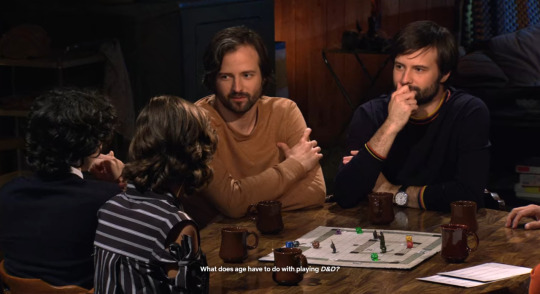
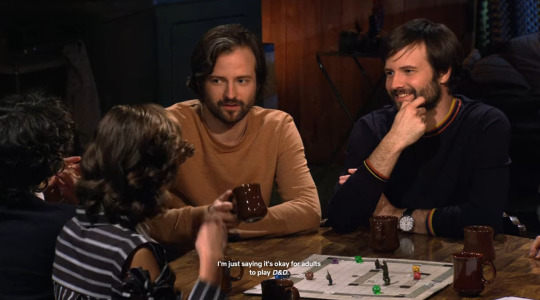

With Will, the “problem” in the story exists because he is the one who represents being weird/the outcast/queer and not giving into the social pressure to “let go” of that—he loves another boy, is more emotional than his peers and loves nerdy things like his tabletop board game and refuses to deny that to himself, no matter how brutalizing that is for him and his feelings. In that way, he is the character who “represents” the sentiment of The Duffers themselves—he is a nerd, a child at heart, and he has no problem taking DnD and anything else into “adulthood,” (looking at you “yeah, yeah I really did” during the rain fight) the same way The Duffers have.
That said: as we move into season 4, Will is presented with an evolution of this conflict—he wants to continue to be honest with and about himself, his feelings, and his interests…but it comes in direct conflict with his understanding of his peers & Mike, whom he loves.
We see this conflict show up repeatedly in Will’s actions in S4, especially in regards to the painting, which is the physical representation of both his love of Mike and his embracing of his nerdiness. Will shows up to the airport with his painting in spite of not speaking to Mike because his heart is to be honest and true-to-self regardless of anyone else—you even see this as he takes the painting on the road when they plan on going back to Hawkins, after he makes up with Mike. The problem is though (and this plays into the whole “we want you to feel like you lost” sentiment The Duffers spoke about, as S4 is the “down” before the “up”resolution of the whole narrative) that Will he realizes that his desire to be honest is getting in the way of (his perception of) the happiness of the people he loves, so he decides to betray his character and break the first cardinal rule of The Party…to tell his first lie.
There are plenty of phenomenal analyses on other aspects of Will’s connection to Vecna/the UD and the love triangle dynamic at play across this app so I’ll leave that alone here (I do have many thoughts on why the above makes Henry Creel the perfect villain foil to Will specifically), but: for the sake of understanding Will’s relational narrative arc, it’s critical to understand that our “low” for him is the betrayal of his ongoing S3 character—and that him undermining his self-honesty, nerdiness and love for Mike are the things that The Duffers have set themselves up to resolve in S5.
The resolution for Will is to re-embrace his differences —to realize that lying to yourself and other people about who you are and what you love (both in terms of “nerdy” interests and his queerness) is not who he wants to be, no matter how hard it is to stand up for in the wake of adversity—along with embracing the power of real love, which is also an ongoing theme the Duffers have set up in their relationships beginning in Season 3.
Now…on to Michael.
Mike’s Arc: Finding Yourself & Embracing What Makes You Different
—anyone with a single toe in this fandom knows that Mike Wheeler is one of the most divisive characters in this story when it comes to deciding 1) what his motivations are and 2) what his desires will be, but (and bare with me on this)…I think that’s kind of the point of his story. Mike’s “three season” arc is about him moving through a confusion of identity into someone who can embrace himself while addressing the things he is most insecure about—namely; being seen, being useful, and (very, very likely) the fact that the person who makes him feel most secure, seen, useful and loved is another boy.
There are several context clues that give credence to the fact that the reason Mike feels so wishy-washy / lacking in depth is because his struggle is not knowing how to find his place in the world, though you have to go further back than S3 to find them. Let me explain.
From the literal pitch of the show, there has always been an undercurrent of self-doubt and insecurity in Mike; his desire to escape the weight of feeling insecure has been a driving factor in his actions since before he was even on the screen, and it is impossible to understand what motivates him without first understanding that.

With Mike, his actions across all seasons have been weighed down by his desire to escape his insecurities through action—and as he’s gotten older, what he’s used to escape those insecurities (to be someone like the paladin he plays in DnD) has evolved and shifted, ranging through everything from turning the world (no pun intended) upside down to find Will; being willing to sacrifice his life to save Dustin from bullies; using any weapon he could find to fight a baby demogorgon; and wanting to be a heroic knight who protects the perceived vulnerable girl once he starts dating Eleven.
The point is: Mike’s deepest core need is to assuage his insecurities by doing whatever he can to be a good person—and when he feels like can’t do anything or protect the people he loves…he spirals. That’s been true since the start of his character…and everyone from The Duffers to Finn Wolfhard himself has mentioned it.
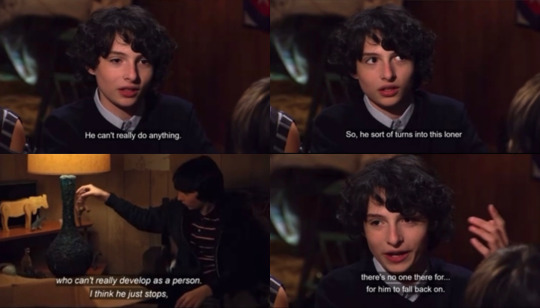
Now. With that baseline established, let’s talk Season 3.
Ironically enough, a lot of people feel like Mike’s character has “fallen off” because he, by the sake of all appearances, has achieved all the things he is supposed to want—namely a girlfriend, which (at least in his mind) is the physical embodiment of successfully “addressing” his core fears.
Because Mike has all the external markings of a well-adjusted kid—he comes from a wealthy family, has a solid group of friends (who are also mostly now striving for social normalcy) and even a girlfriend—he seems to have addressed what many people even in real life believe is the end of most arcs & the fulfillment of the fantasy. For Mike, the appearance of his S3 life seems to have assuaged the fears at the root of several of his insecurities, including the desire to be needed, the desire to protect, the desire to be useful, and the desire for acceptance…all because now he’s saved El and has her at his side, and having a girlfriend means he has everything a good, well-adjusted guy is supposed to want.
Or…does it?
With how The Duffers set up the story (with S3 as the introduction of a new conflict for every major character), the answer they’re giving you based on how Mike interacts with other characters is no—having a girlfriend and acting “mature” doesn’t solve anything, especially if the core problem of you having an insecure identity while being dishonest with yourself isn’t addressed…and it’s the arc of Mike learning that “lesson” that we find ourselves dropped into moving into Season 3.
Beginning in S3, the war on Mike’s insecure self-concept comes at him on two fronts: on the one side, El, who started her journey needing Mike because of her background but now has no real need for any of the things he so desperately wants to provide as a means to validate himself, and on the other Will, whose deep familiarity and history with Mike combined with his confidence in his own identity presents Mike with a challenge of self-reflection that he doesn’t exactly feel ready for yet.
(sidebar: my post on how Mike's arc is intrinsically tied to a subversion of the "Born Sexy Yesterday" trope is a helpful expansion on things I talk about here).
We see this in how Mike gets frustrated with Max for giving El the space and language to not need him (undermining his role in her life as someone who she needs to protect/guide her); we see it in how he says cruel things when Will behaves in a way that challenges the actions Mike has taken to be “mature” (how he insults Will for not also wanting a girlfriend / still wanting to play the games that set them apart as nerds/different); and we see it in how Mike still goes out of his way to fix those relationships in the best way he can—because he knows on some level that what he’s doing in several moments isn’t in alignment with who he wants to be, even though they are both presenting him with radical internal challenges.
Ironically enough, Dustin does a great job of summarizing the two sides of Mike's internal conundrum in what he says to Steve about Robin—Mike, somewhat like Steve, is struggling between what is socially acceptable in a partner (or "cool") and what he actually wants and enjoys in one—and as El and Will evolve, so does Mike's internal conflict about how he perceives their places in his world.
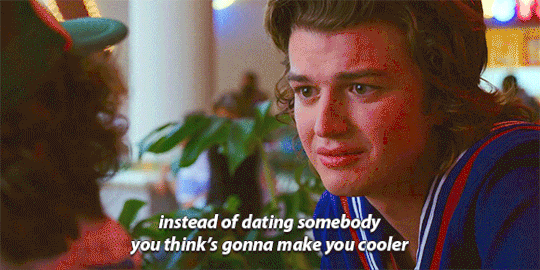
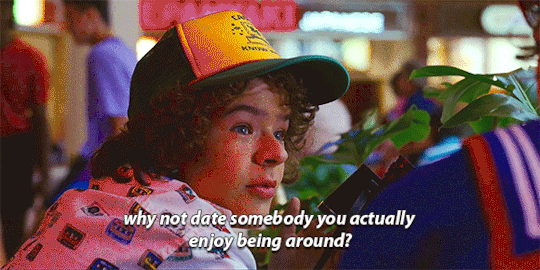
Between El’s supernatural abilities and rapidly growing autonomy making him obsolete to her in all the areas that matter to Mike (see: the ability to protect, be useful, and be seen) and Will’s reminding him that at his core he is just as much of a nerd as Will is, Mike finds himself feeling more confused and insecure than ever…and that is the internal conflict we see him end S3 battling.
The evolution of Mike’s narrative arc past the introduction of this internal conflict doesn’t happen until is the Byers/Hopper move to Lenora though…when he is literally left alone to process what that intense summer brought to light for him—which is the note we're left on as we move into the next phase of Mike's evolution in S4.
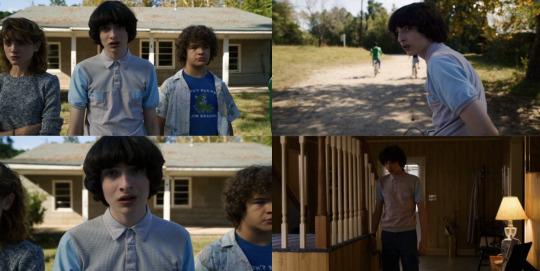
In S4, the development of Mike figuring out what he wants and needs from his relationships + the kind of person he wants to be becomes a lot more external—we see him going through a series of code switches as he tries to manage the ever changing landscape of his self-perception, where has started journey toward self-acceptance but is still insecure about following through with it.
We see this in the way he has now joined The Hellfire Club and shows sincere signs of accepting his interests and "outcast" status, but still looks forlorn when Lucas says “I’m tired of being bullied / I thought you wanted things to be different too” (Lucas’ struggles with some aspects of performing normalcy the way Mike does S4).
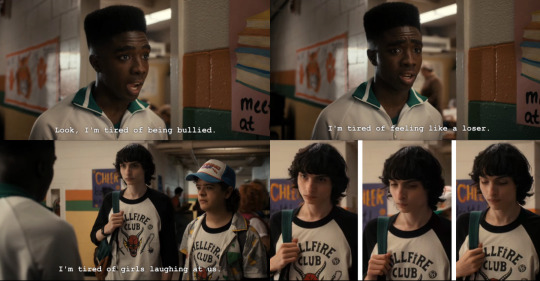
We see it in the way he shows up to Lenora dressed in what he thinks he’s should be wearing rather than as himself / the way he continues performing his relationship with El throughout that first day (and how he says it was Will who "sabotaged" things by being that same kind of radical honest about his feelings we talked about before)...only for the events of the day to spur him into meaningful honesty with both El and Will (to varying degrees of success) mere hours later.
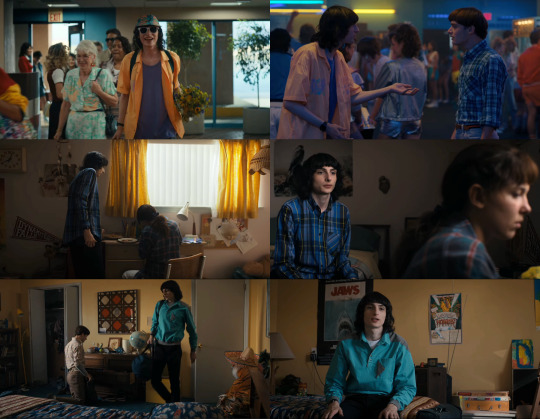
We even see it in the way Mike seemed to have been “turning over a new leaf” once he and El fought, to the point he was okay with them ending the “normalcy” performance of their romance…right up until Argyle’s paranoia while burying Unknown Hero Agent Man struck the fear of god back into him (aka making him worry he was letting El down by not protecting her—aka tapping into one of his core fears).
Basically: Mike is leaning into accepting the things that make him different in little ways, but is still struggling to step into that identity fully—aka he is still using perceived social acceptability as a shield, even though he no longer holds as tightly to being perceived as normal. (Even Finn himself often jokes about Mike “just trying to be normal,” which I think is a good, simple explanation of what’s happening—that said, if we take that reading and combine it with those “narrative goals” I mentioned The Duffers have earlier…Mike trying to be normal is an issue to be resolved, not an identity to be embraced. But…let’s move on).
By the time we get to the infamous van scene, we’ve watched Mike struggle through the two sides of his inner conflict for the entire season now, and felt him very gently succeed at switching into a more honest version of himself (who doesn’t need a girlfriend as a shield / can embrace his “otherness” in the same way Will does) right up until his inherent desires to be needed and useful come rearing up the second El is in danger.
It’s why we see him look pleased (but also marred with conflict) when Will looks confident, happy and radiant talking about “playing dnd and Nintendo for the rest of their lives…” and why him being honest in that scene is actually a huge moment for him, because rather than being vague about what has been plaguing him for two seasons now (trying to be “normal” just because he feels insecure) Mike is finally verbalizing the internal conundrum of his now two seasons of looking critically at his insecurities.
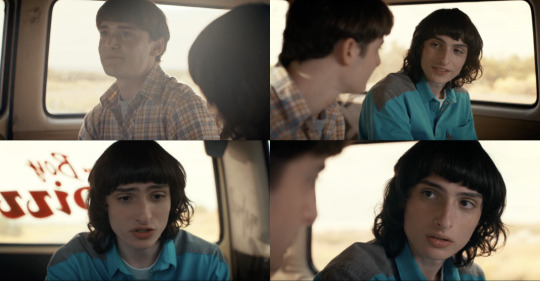
Now—I could spend all day digging into just that bit of narrative alone—the way Mike finally externalizing his insecurities to be processed with Will rather than acting on them and hurting people unintentionally is a giant leap for him, and how when Will says “you’re sacred of losing her” Mike’s nod is an acknowledgement that Will is right…but his face is saying there’s more to that fear than he’s acknowledging—
—but for the sake of this analysis of the narrative arcs, the van scene is most important because it’s when the S4 “it feels like you lost” moment begins for Mike…and that’s because it matches up directly with the “you feel like you lost” moment for Will: him lying about the painting.

When Will lies about the painting—saying that his feelings and the art that (as I said before) represents 1) his love of Mike, 2) his embracing of his nerdiness and 3) that radial self-honestly Mike so admires Will for—it throws a wrench into Mike’s internal revelations because Will is essentially saying that the relationship that Mike was slowly realizing he used to assuage his insecurities (his relationship with Eleven) is actually what lines up best with "who he wants to be," which throws Mike’s slow growth toward Will + honesty about what (and who) he wants to be into a tail spin.
From Will’s lie onward, Mike is thrown into moment after moment of conflicting emotions and dire circumstances as well—and given that Mike's deep terror of losing people comes up strongest when the people he loves are in danger, it’s only downhill for Mike’s growth toward self actualization from here. In that sense, (much Jonathan's S4 omissions of his truths/fears to Nancy leading to Nancy's regression into complacency / social conformity with Steve), its Will's lie that leads us directly into the “you feel like you lost” moment for Mike: him moving back into "conforming" territory and confessing his love to El in the SBP.
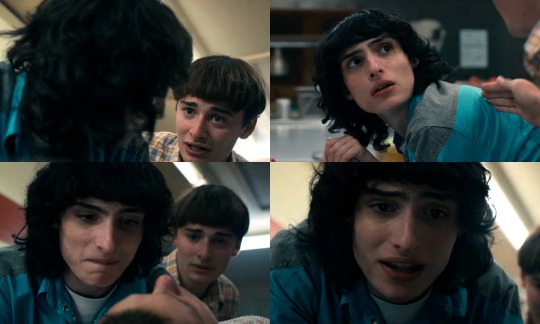
The monologue (at least in terms of the narrative arc The Duffers are writing) is Mike’s “losing” moment because it’s when he has enough self-revelation to realize that being with a girl as a shield for his insecurities is no longer what he wants...but the drive he has to be useful, protect and love any way he can (on top of Will’s urging + lie) leave him feeling like his only option is stepping into the person he was at the start of S3.
In this moment, we see Mike say exactly what someone who is "acting normal” about loving his girlfriend and wanting to save her would….even though romantic love with El (and the socially-acceptable romantic relationship he has with her) are not what he really wants, and what we will watch crumble moving into S5.
Essentially: Mike having a moment of dissonance of that magnitude after an entire season of looking toward Will was what set us up to see all those "external markings of normalcy" Mike has held onto and had started grating against for two seasons now fall apart, given what we know about those core messages/themes/child-at-heart values the Duffers hold and keep at the heart of their show.
As of the end of S4, we can already see how this "regression" into his old self is not going to hold—the fact that everything Mike did to save El is rooted 1) in a lie and 2) not in alignment with Mike evolving understanding of his core desires makes sure of that.
We even see the beginnings of this "low" being resolved in Mike's arc in how Mike & El are not speaking (even with the 'resolution' of their surface-level S4 conflict with Mike's love confession) and how Mike is glued to Will's side even before Vecna is mentioned–which is how we've been set up to see the resolution of Mike's arc in S5.
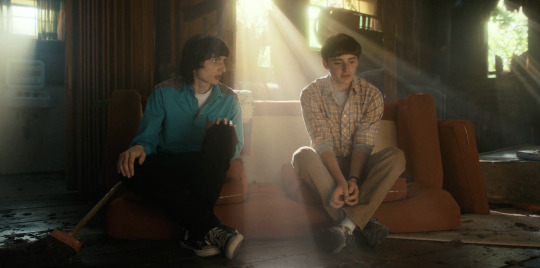
With all this in mind, it becomes a bit clearer that the resolution of Mike's arc is him moving through the confusion of identity we've watched him go through from S3 forward and into someone who can embrace who he is what he truly loves without fear of going against what is expected—aka finding the courage not to conform.
Mike as a character is a lesson in how doing what you think you're supposed to (aka what is "normal") is often at odds with who you are and what makes you the happiest—and the only way to self-actualize is to move past your insecurities and into someone who can be confident embracing what (and who) they really want...even when it means stepping out of line from what you’ve grown up believing would do the self-actualizing for you.
Final Thoughts
Both Mike and Will's relational arcs revolve around an embracing of what makes them different—in terms of their (highly likely) mutual queerness, yes, but also in terms of them making self-actualized peace with being nerdy "children at heart" in much the same way The Duffer Brothers themselves are.
If Will represents a person who struggles because they refuse to deny themselves their identity, Mike represents a person who struggles because they don’t understand their identity, and are walking around just trying to do whatever they can to get along (because they haven’t been presented with the inciting conflict that will move them into self-revelation & growth).
Both of these internal conflicts are narrative arcs that have been built into the coming of age stories of both halves of Byler—and though we are currently sitting at the "low" of both of their arcs as of the end of Season 4, the setup and though-line for them finding themselves (and real, honest love with each other) has been clearly set up for exploration in Season 5.
—if you managed to get through all of this, I commend you. And yes, there are a million other things to be explored between these two, but...I enjoy sorting through the thematic / "moral of the story" through-lines in all my media, so of course I was gonna do it for for Byler!
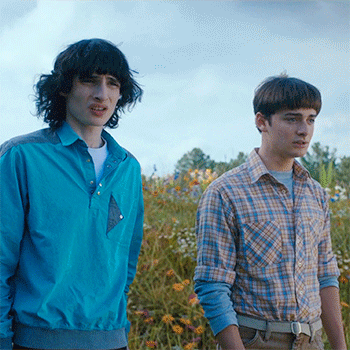
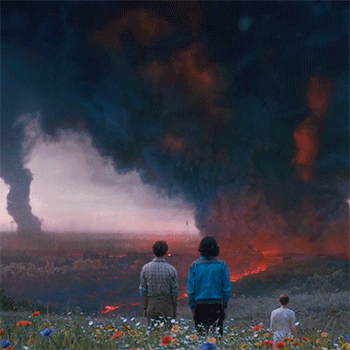
#byler#mike wheeler#will byers#THIS IS THE LONGEST THING EVER AND I'M STILL NOT 100% SURE ITS COHERENT BUT I'M TIRED OF SITTING ON IT LMAO#I will also probably be editing bits and pieces of it over the course of the next day for coherence so apologies if you find an error lol#but !!! this is the most cohesive way I could think to explain how their arcs work separately and individually#esp with the ' big messages' of the Duffers discussed /included#ANYWAY. HAPPY FRIDAY LOL#mike wheeler core#will byers core#my st commentary#stranger things#the me tag#the come back tag#duffer brothers
320 notes
·
View notes